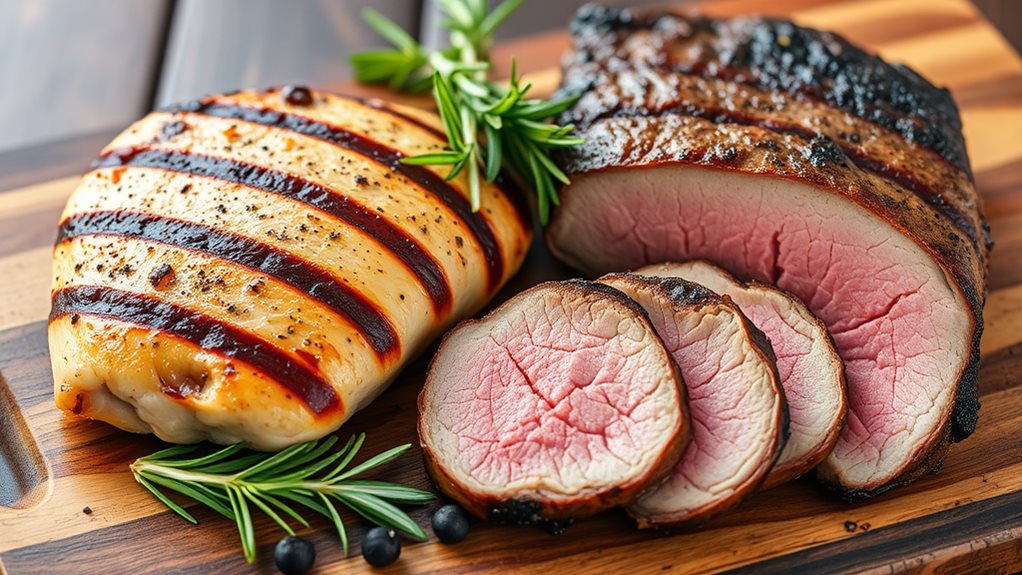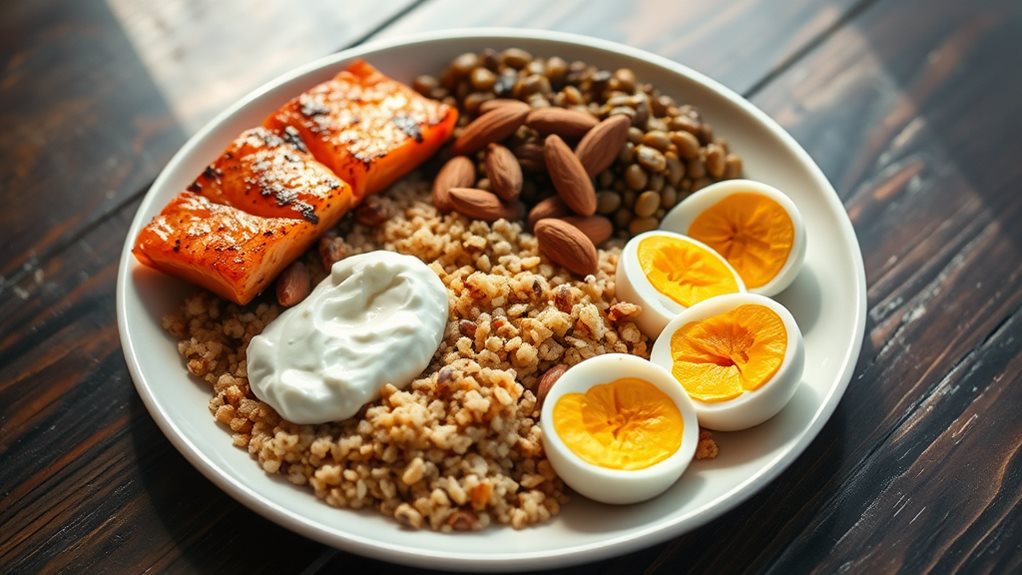7 Ways Men Over 60 Meet Protein Needs
If you're a man over 60, you've likely heard about the importance of protein for maintaining muscle mass and overall health. But knowing how much protein you need and the best ways to get it can be challenging. Whether you're dealing with changing dietary needs or simply want to optimize your nutrition, there's more to meeting protein requirements than just eating meat. Let's explore seven practical strategies that can help you reach your daily protein goals.
Key Takeaways
Consume 4-6 ounces of lean meat like chicken breast or turkey per meal, delivering about 25 grams of protein per serving.
Include fatty fish twice weekly for omega-3 benefits, choosing salmon, mackerel, or sardines for optimal protein and heart health.
Add Greek yogurt and cottage cheese to meals, providing up to 20 grams and 14 grams of protein per serving respectively.
Incorporate plant-based proteins like lentils and quinoa, which offer 15-18 grams and 8 grams of protein per cup.
Use whey protein supplements between meals, aiming for 20-30 grams per serving after consulting healthcare providers.
Lean Meat and Poultry Portions

Three key lean protein sources - chicken breast, turkey, and lean beef - provide essential amino acids for men over 60.
You'll want to aim for 4-6 ounces of these proteins per meal to meet your daily requirements of 1-1.2 grams per kilogram of body weight.
Choose skinless chicken breast and turkey cuts, which deliver roughly 25 grams of protein per 3-ounce serving.
When selecting beef, opt for lean cuts like sirloin, flank steak, or tenderloin, containing about 23 grams of protein per 3-ounce portion.
These cuts help maintain muscle mass while limiting saturated fat intake.
Prepare your portions by grilling, baking, or broiling rather than frying.
You can also slice meat thinly and incorporate it into stir-fries or salads for easier digestion and portion control.
Consuming protein within 30 minutes post-workout maximizes muscle preservation and growth potential for aging men.
Fish and Seafood Options
While red meat and poultry provide excellent protein sources, fish and seafood offer unique nutritional benefits for men over 60. You'll get heart-healthy omega-3 fatty acids along with high-quality protein when you eat fatty fish like salmon, mackerel, and sardines. These fish help reduce inflammation and support brain health.
Try to include at least two 4-ounce servings of fish weekly. White fish like cod, halibut, and tilapia are lean protein options that are easy to digest.
Shellfish such as shrimp, scallops, and mussels pack impressive protein content while being low in calories. They're also rich in zinc and vitamin B12, nutrients particularly important for older men's health.
Consider canned tuna or salmon for convenient, budget-friendly protein sources that don't require cooking expertise.
Regular consumption of fish can support healthy testosterone levels through improved gut microbiome balance and reduced inflammation.
High-Protein Plant Sources
Although many men associate protein primarily with animal products, plant-based sources can greatly contribute to daily protein needs.
You'll find substantial protein in legumes like lentils, chickpeas, and black beans, which pack 15-18 grams per cup. Quinoa, a complete protein grain, delivers 8 grams per cooked cup.
Don't overlook nuts and seeds - almonds provide 6 grams per ounce, while pumpkin seeds offer 9 grams.
Soy products are especially protein-rich: tofu contains 20 grams per cup, while tempeh packs 31 grams. Even green peas contribute 8 grams per cup.
You can boost your protein intake by adding these plant sources to salads, soups, and stir-fries.
They're also rich in fiber, minerals, and heart-healthy fats that benefit your overall health.
Since digestive enzyme production naturally declines with age, combining these protein sources with digestive enzyme supplements can help maximize nutrient absorption.
Dairy Products and Alternatives

Dairy products offer excellent protein options for men over 60, with one cup of Greek yogurt delivering up to 20 grams of protein.
If you're lactose intolerant or prefer dairy alternatives, you'll find plenty of protein-rich substitutes that can help you meet your daily requirements.
Choose cottage cheese for a versatile protein source - it packs 14 grams per half cup and works well in both sweet and savory dishes.
Add protein-fortified plant milk like soy milk, which provides 8 grams of protein per cup.
Try kefir, a fermented dairy drink that offers 10 grams of protein per cup plus beneficial probiotics.
Include protein-rich cheese varieties like Swiss or mozzarella, delivering 7-8 grams per ounce while also providing calcium for bone health.
Protein Supplements and Shakes
Beyond natural food sources, protein supplements and shakes can offer a convenient way to meet daily protein requirements for men over 60.
You'll find whey protein isolate particularly beneficial, as it's easily digestible and contains all essential amino acids. Choose supplements with minimal added sugars and artificial ingredients.
Consider timing your protein shake consumption strategically - after exercise or between meals when you're struggling to meet your protein goals through whole foods alone.
You'll want to aim for 20-30 grams of protein per serving. If you're lactose intolerant, opt for plant-based alternatives like pea, hemp, or rice protein.
Always consult your healthcare provider before starting any supplement regimen, especially if you have kidney issues or take medications that could interact with protein supplements.
Protein-Rich Snacks and Meals
When planning protein-rich snacks and meals, you'll want to focus on incorporating a variety of nutrient-dense options throughout your day.
You can easily boost your protein intake by choosing strategic combinations of foods that work well together and taste great.
Pack hard-boiled eggs with whole-grain crackers and cheese for a quick snack that delivers 15-20 grams of protein.
Create a power-packed lunch by adding grilled chicken to your salad, topped with chickpeas and a sprinkle of pumpkin seeds.
Make a hearty breakfast bowl with Greek yogurt, mixed berries, and a handful of chopped almonds.
Prepare dinner with lean fish like salmon, paired with quinoa and roasted vegetables for a complete protein-rich meal.
These options help you meet your daily protein requirements while maintaining a balanced diet.
Meal Planning Strategies

To successfully maintain adequate protein intake, you'll need a systematic approach to meal planning that fits your lifestyle and nutritional goals.
Start by dividing your daily protein target into three main meals and two snacks, aiming for 25-30 grams per meal.
Keep a weekly meal calendar and prep ingredients in advance. You'll find it easier to stick to your plan when you've got proteins portioned and ready to cook.
Stock your freezer with individual servings of lean meats, fish, and prepared meals for busy days.
Plan breakfast proteins the night before, whether it's setting up overnight oats with protein powder or hard-boiling eggs.
Create a rotating menu of favorite protein-rich meals and maintain a grocery list of staple items you'll need to prepare them.
Frequently Asked Questions
How Does Protein Absorption Change With Age in Men Over 60?
As you age beyond 60, your body's protein absorption naturally declines due to reduced stomach acid production and digestive enzyme levels.
You'll notice decreased muscle protein synthesis and slower nutrient uptake in your intestines.
Your body becomes less efficient at breaking down and utilizing protein, requiring you to increase your protein intake to maintain muscle mass and overall health.
Can Certain Medications Affect Protein Metabolism in Older Men?
Imagine you're taking corticosteroids for arthritis - these medications can actually increase protein breakdown in your muscles.
Yes, several medications can affect how your body processes protein. If you're on proton pump inhibitors (PPIs) for acid reflux, they'll reduce your stomach acid, making it harder to break down proteins.
Blood pressure medications like ACE inhibitors may alter nitrogen balance, while some diuretics can increase protein loss through urine.
What Time of Day Is Best for Protein Consumption?
You'll get the most benefit by spreading your protein intake throughout the day rather than consuming it all at once.
Your body processes protein most effectively when you eat it every 3-4 hours. Start with a protein-rich breakfast, include some at lunch, and don't skip it at dinner.
If you're exercising, try to consume protein within 30 minutes after your workout to support muscle recovery and maintenance.
How Does Dehydration Impact Protein Utilization in Senior Men?
When you're dehydrated, your body can't efficiently process and utilize protein.
You'll experience reduced protein synthesis, slower muscle recovery, and compromised kidney function.
Your blood becomes more concentrated, making it harder for your body to transport nutrients, including amino acids, to your muscles and organs.
To maximize protein utilization, you'll need to drink plenty of water throughout the day - aim for 8-10 glasses daily.
Should Protein Intake Vary Based on Activity Level for Men Over 60?
Yes, you'll need to adjust your protein intake based on your activity level after 60.
If you're sedentary, aim for 0.8-1.0 grams per kilogram of body weight daily.
When you're moderately active, increase that to 1.0-1.2 grams.
If you're very active or strength training, you should consume 1.2-1.5 grams per kilogram.
You'll maximize muscle maintenance and recovery by matching your protein intake to your exercise routine.
Conclusion
Like a well-oiled machine, your body needs the right fuel to keep running smoothly after 60. You'll find success by combining these protein strategies into your daily routine. Whether you're grilling lean meats, enjoying fatty fish, or mixing up protein shakes, you've got plenty of options to maintain muscle strength and overall health. With smart planning and consistent habits, you'll meet your protein needs effectively.
